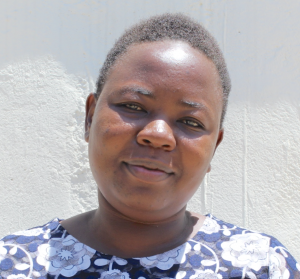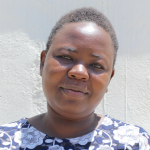The Malekha Dispensary is the primary health center for residents in the area, serving an average of 70 patients per day. However, the dispensary faces a critical issue: it lacks access to clean water, which is essential for providing proper patient care and medical services.
The staff and patients currently rely on a single protected hand-dug well for all their water needs. Although the water appears clean and has no unpleasant taste or odor, the well sometimes runs dry during dry seasons. Water is fetched using a rope and a jerrycan, which is a laborious process that poses a risk of contamination.

The seasonal well where people collect water.
Without clean water, even the simplest medical task becomes risky. The staff do their best, but when the water source is questionable, infection prevention becomes almost impossible.
Without clean water, there is no water to drink or take medication, hands cannot be washed, bed linens and treatment rooms may not be properly cleaned, instruments may not be sterilized, and patients face a silent but deadly threat: infection. When the taps are dry, disease spreads quickly — not just among patients, but among the health workers who care for them.
And beyond the walls of the clinic, clean water builds trust. When a health center is clean and safe, people are more likely to come for care.

Field Officer Betty Muhongo put the health center's water issue into perspective.
"The idea of being in need of treatment and having to wait for long periods of time or being redirected to another facility because there is no water makes my heart sink a little," said Betty.
Jacob Kaskon, the 48-year-old clinical officer in charge of the facility, shared his thoughts.

Mr. Kaskon.
"The protected hand-dug well is mostly functional during the rainy season. During the dry season, the waterpoint goes completely dry," shared Mr. Kaskon.
"As a health officer, water helps to protect both me and my patients. Without it, the risk of exposing someone to a disease is a lot higher. At the same time, to run certain activities, there is [a] need to have a lot of water. I would say it gives life to this facility, making the term water is life literal," he continued.
We plan to help Mr. Kaskon provide the best care possible to the local community by installing a borehole well at the clinic. This will provide the staff and patients with ready access to clean, safe water whenever needed. Then, with water readily available, the focus can be on healing and ensuring people stay healthy.
Steps Toward a Solution
For health care settings, immediate access to a large quantity of clean water is crucial for handwashing, sterilization of equipment, cleaning, and safe childbirth. Water that is off-site creates delays, impacts patient care, and increases the risk of hospital-acquired infections.
Our coverage goals aim for all health centers to have an on-premises water source that will sufficiently serve the patients, healthcare providers, and staff to ensure accessibility, reliability, and safety. With more water available, healthcare workers do not have to ration water, worry about purchasing water with their limited funds, or make tough decisions about when to wash their hands or equipment.
Reliable, clean water ensures that healthcare workers have sufficient water so they can provide excellent patient care!
Our technical experts worked with the health center leadership and the local community to identify the most effective solution to their water crisis. They decided to drill a borehole well, construct a platform for the well, and attach a hand pump.
Well
Abundant water often lies just beneath our feet. Aquifers—natural underground rivers—flow through layers of sediment and rock, offering a constant supply of safe water. A borehole well is drilled deep into the earth to access this naturally filtered and protected water. We penetrate meters, sometimes even hundreds of meters, of soil, silt, rock, and more to reach the water underground. Once found, we construct a platform for the well and attach a hand pump. The community gains a safe, enclosed water source capable of providing approximately five gallons of water per minute. Learn more here!
Handwashing Stations
Alongside each water source, we install two gravity-fed handwashing stations, enabling everyone at the health center to wash their hands. Handwashing is crucial for preventing water-related illnesses within the health center and community. Health center staff will maintain the stations, fill them with water, and supply them with soap, which we often teach them how to make.
Latrines
We ensure there are Ventilated Improved Pit (VIP) latrine blocks that effectively prevent the transmission of fecal diseases. Each latrine will boast a durable cement floor for easy use and maintenance. We’ll ensure at least one stall is reserved for staff, along with gender-separated toilets that include menstrual hygiene facilities and accessible options for individuals with limited mobility.
Health Care Staff and Community Education & Ownership
Hygiene and sanitation training are integral to our water projects. Training is tailored to each community's specific needs and includes key topics such as proper water handling, improved hygiene practices, disease transmission prevention, and care of the new water point. Safe water and improved hygiene habits foster a healthier future for everyone in the community.
Encouraged and supported by the guidance of our team, a water user committee representative of the community's diverse members assumes responsibility for maintaining the water point, often gathering fees to ensure its upkeep.

 Borehole Well and Hand Pump
Borehole Well and Hand Pump
 Rehabilitation Project
Rehabilitation Project




















